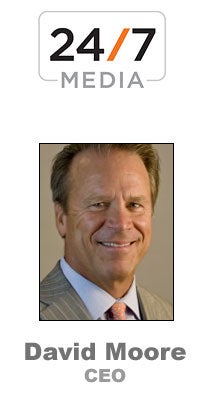 At a time when data and technology are an integral part of the advertising/marketing chain, the concept of the traditional ad holding company is changing. Once thought of as mere tools to be accessed on an ad hoc basis, data and tech are now central to the process of media buying and planning.
At a time when data and technology are an integral part of the advertising/marketing chain, the concept of the traditional ad holding company is changing. Once thought of as mere tools to be accessed on an ad hoc basis, data and tech are now central to the process of media buying and planning.
That was probably part of the thinking of WPP Group’s Sir Martin Sorrell five years ago when he surprised many tech M&A observers and beat out Microsoft to acquire interactive shop 24/7 Real Media for $649 million, which last week shortened its name to 24/7 Media. It followed that small, but noteworthy, bit of news with word of a strategic partnership with DG’s MediaMind, that is intended to put third-party online ad serving and TV ad delivery squarely in 24/7 Media’s hands.
Although unrelated, the two announcements reflect the changes taking place in the larger business of advertising: on the one hand, it’s about the nature of expanding the function of the interactive disciplines within the agency realm. It’s also about figuring out how to constantly improve the efficiency and accuracy of digital buys along audience buying by asking whether its best to build these skills in-house or out. The answer, Dave Moore, 24/7 Media’s chairman and CEO, told us, is sometimes all of the above.
AdEXchanger: After all these years, what was the idea behind the rebranding and why now?
DM: If you remember, the company started as 24/7 Media. We bought Real Media at the end of 2001 and changed the name at the time. And it was unwieldy, especially when giving someone your email address. Aside from that, we started a new unit a few years ago called the Media Innovation Group. It will be our five-year anniversary since being purchased by WPP in July.
The point is to position the company as 24/7 Media – the group that builds innovative platform-neutral digital marketing technology solutions. And by doing that, it powers, but is not limited to, focusing The Real Media group as the sell-side part of the organization. The whole company was known as a network in North America. We wanted to shift that view to make 24/7 Media front and center and make sure it’s known for developing great technology.
AdExchanger: So is the change largely reflective of how 24/7 evolved within WPP? Or is this about changes that have been occurring outside the holding company?
DM: When we were purchased by WPP, we were strictly a sell-side group. Then, we were thought of as a network. It ultimately became confusing. At the start, we didn’t do any creative. We didn’t buy any media. And the Media Innovation Group was eventually spawned from our technology because WPP’s agencies needed digital media capabilities that couldn’t have come from anywhere else in the organization. For example, GroupM had plenty of media capabilities, but they didn’t have technology. They outsourced those needs.
Sir Martin Sorrell believed, as I did and still do, that in order to develop competitive advantage in the digital space, you needed to own the technology, especially when it comes to accessing our own database and using it to target advertising. Still, that is also foundational and we’re not going to limit ourselves either. For example, we have and will continue to partner with third parties like Omniture, Double Verify and a variety of others that have technology that we can integrate into our platform. That is really the formula for competition in the digital ad space right now.
AdExchanger: How do you want to be seen within the WPP firmament? As a standalone agency?
DM: No, no, not at all. The Media Innovation Group goes after the smaller accounts: $5 to $20 million range. They work with WPP agencies that have no media capability and have no intention of bringing that discipline in-house. But our biggest client is GroupM. Those guys spent $5 billion in digital display advertising last year. We’re very intent on providing the technology platform that allows them to not only buy display, but also buy search.
“Agency” is not the right term for us. None of our businesses create any advertising. We don’t work directly for clients, with a few exceptions at The Media Innovations Group.
AdExchanger: In terms of the growth plans, what does the market look like through the prism of all the changes 24/7 has been plotting?
If you look at the three big growth areas: video, mobile and social, we’re working to have a place in all those areas. WPP has a lot of investment in social media tools, like Buddy Media and others, that provide different levels of intelligence that can applied across marketing, PR or display advertising. While we’re primarily involved in the latter, it’s important for us to have a hold in all those areas as we serve the wider group.
By David Kaplan












